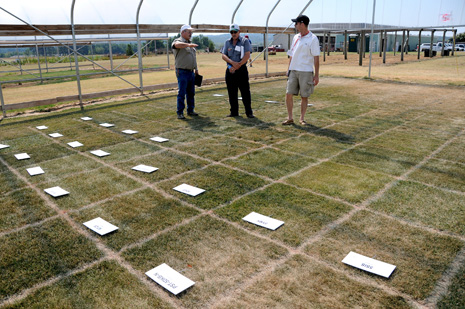
FAYETTEVILLE, Ark. — With temperatures topping 100 degrees before lunch, more than 200 turfgrass professionals who turned out for the 2011 University of Arkansas Division of Agriculture Turfgrass Field Day learned what they could do to keep grass alive while conserving water during Arkansas' hot, dry summers.
The field day was held Aug. 3 at the Arkansas Agricultural Research and Extension Center, two miles north of the University of Arkansas campus in Fayetteville.
Mike Richardson, professor of horticulture, said the division has been involved with the Turfgrass Water Conservation Alliance since its inception some two years ago. The Turfgrass Water Conservation Alliance is a nonprofit group formed by three leading seed companies. Richardson and colleague Doug Karcher, associate professor of horticulture, lead the organization's research team, which evaluates turfgrass varieties for drought tolerance.
"It's estimated that demand for water has increased three times over the past 50 years and will continue to increase in the years ahead," Richardson said. "Weather has also taken a toll on our water resources. Our water supply and quality are threatened by persistent and intensifying drought and dry conditions."
These factors result in increasing pressure to conserve water, especially related to turfgrass care and maintenance, Richardson said.
"Just about all grass seed says 'drought tolerant' on the bag," Richardson said. "But most of those varieties may not be the most drought tolerant types for a particular species," he said.
"The TWCA aims to brand seed bags for drought tolerant grass with their logo," Richardson said. "That brand will identify products that are shown by research data to be truly drought tolerant."
On behalf of the Turfgrass Water Conservation Alliance, Richardson conducts tests to measure the drought tolerance of turfgrass varieties. Replicated test plots are planted under shelters designed to restrict natural rainfall and each variety is planted and maintained, including adequate irrigation, according to industry standards for one growing season to make sure it is well established.
Beginning in the second growing season, irrigation is withheld from the plots to encourage drought stress symptoms. The response of each variety is measured twice weekly using digital analysis of color. When all plots have fallen below 25 percent green turf cover, they are saturated with water and recovery of each entry is evaluated with digital analysis until plots reach 100 percent green cover.
"Armed with accurate information, we can use less water to maintain lawns and golf course and athletic field turfgrasses," Richardson said.
"Sod companies are on board with our program," Richardson said. "They want to get their products into our test plots."
In another field day presentation, graduate student Luke Laird discussed irrigation technology that can help save water for turfgrass management. He is comparing the use of wireless moisture sensors to manage irrigation against more traditional calendar-based irrigation schedules.
Laird said the use of moisture sensors may conserve water while reducing the affects of over-watering. "It will likely result in a healthier turf system, save money and improve environmental sustainability through water conservation," he said.
The field day also offered up-to-date information about new products and a host of other Division of Agriculture turfgrass research. Research presentations included:
- new grass cultivars for lawns, sports fields and golf;
- pest control studies;
- putting green management;
- fertility testing; and
- sports field construction.
Topics
Contacts
Mike Richardson, professor
Department of Horticulture
479-575-2860,
Doug Karcher, associate professor
Department of Horticulture
479-575-5723,
Fred Miller, agricultural communications
University of Arkansas Division of Agriculture
479-575-5647,